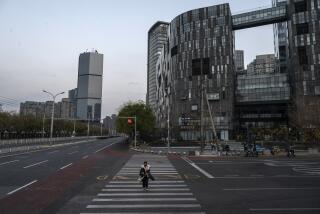New 2-Day Weekend Has Chinese Packing
BEIDAIHE, China — Legions of families armed with chairs and umbrellas cover the shoreline, children slurp down ice cream cones and parents complain about the prices.
Such scenes, long familiar to holiday travelers in much of the world, have finally come to China, where the two-day weekend has been introduced to the communist workers’ paradise.
“I’ve never been here before,” Zhang Jinmei said as she dragged her 8-year-old daughter to take photos amid the boulders jutting from the shore into the Bohai sea. “There just wasn’t enough time.”
Beidaihe is attracting families like Zhang’s for the same reason it drew European and American businessmen and diplomats at the turn of the century: fine stretches of beach less than 180 miles from China’s capital, Beijing, and its port, Tianjin.
For the first three decades of Communist Party rule, Beidaihe was the resort of the elite.
Ordinary Chinese got to hunt for seashells and stroll the hilly, shady streets if their “work units” rewarded them with a trip.
Party leaders still come for the perks. But now they are joined by accountants, schoolteachers and taxi drivers with enough money for a couple of days of sun and seafood.
“We can use a few more days,” said Zhang, a dance teacher. Although she lives in Tianjin, she never before had the time to visit Beidaihe.
Tourism in China took off during the 1980s when the government began to relax restrictions on travel by its citizens. Most people, however, worked six days a week, confining traveling to holidays, vacations or work-related trips.
That began changing in March, 1994, when China trimmed the work week to an average of 5 1/2 days. People worked six days one week, then got Saturday off the next week, their first taste of the two-day weekend.
Starting last May 1, the State Council, China’s Cabinet, gave workers two days off every week.
The government believes the shorter work week will pay off. The Ministry of Labor predicts service industries will add about a million jobs to deal with the increase in travel.
About 500 million Chinese, four of every 10, are expected to take a trip this year. That is 50 million more than last year.
Train travel has surged. The state-run New China News Agency reported that on one day in July, trains carried 3.15 million passengers, surpassing the previous one-day record of 2.8 million during the Spring Festival, or Chinese new year.
In Beidaihe, business has boomed so much that restaurateurs can charge the equivalent of $7.50 for one crab--more than a day’s pay for many urban workers. And still people come in such numbers that a sister resort has sprouted to the south, Nandaihe.
Little more than a place for beaching fishing boats eight years ago, Nandaihe now looks like Coney Island. A huge water slide rises from a white-tiled entertainment complex set back from a beach packed with families and peddlers.
“The tourist season is good this year,” said a man who, like many Chinese, would identify himself only by his surname, Wen. He rents beach chairs, umbrellas and inner tubes and makes enough money so he doesn’t have to work the rest of the year.
“In the winter, I play mah-jongg,” Wen said.
A competitor, who identified himself as Shi, said he can make nearly $100 on a weekend, a month’s pay at a good Beijing factory.
Not everyone is fleeing to the beach. In Beijing, the 200-year-old Summer Palace drew 2.2 million people in May, June and July, 10% more than the same period last year, according to its administrative office.
Weekends have drawn hordes of people to Shihai, a normally quiet neighborhood of old courtyard homes surrounding man-made lakes in central Beijing.
“There are a lot more people now because of the two-day weekend,” said a man named Gao who lives in an alley off one of the lakes.
“It’s pretty peaceful,” Gao said as two men argued over a parking space 20 steps away, “as long as there’s no fighting.”
More to Read
Sign up for Essential California
The most important California stories and recommendations in your inbox every morning.
You may occasionally receive promotional content from the Los Angeles Times.










